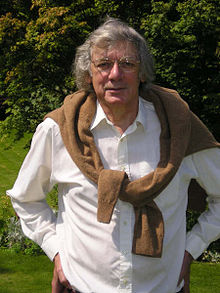Ted Honderich
| Ted Honderich | |
|---|---|

Ted Honderich
|
|
| Born | 30 January 1933 Baden, Ontario |
| Alma mater | University of Toronto, University College London |
| Era | Contemporary philosophy |
| Region | Western philosophy |
| School | Analytic |
|
Main interests
|
Consciousness · Determinism · Philosophy of Mind · Ethics · International Relations · Punishment · Conservatism |
Ted Honderich (born 30 January 1933) is a Canadian-born British philosopher, Grote Professor Emeritus of the Philosophy of Mind and Logic, University College London. His work has been mainly about five things: consciousness and mind, including the consciousness-brain relation; right and wrong in the contemporary world particularly with democracy, terrorism and war; advocacy of the Principle of Humanity; determinism and freedom; particular problems in logical analysis and metaphysics; the supposed justification of punishment by the state; the political tradition of conservatism. He has given lectures and talks in British, continental European, Irish, American, Canadian, Asian, Russian, and African universities.
Honderich was born Edgar Dawn Ross Honderich on 30 January 1933 in Baden, Ontario, Canada. An undergraduate at the University of Toronto, qualifying as B.A. (Hons) in Philosophy and English Literature, he came to University College London to study under the logical positivist and Grote Professor A. J. Ayer, graduating with a PhD in 1968. He has since lived in England and become a British citizen. After being a lecturer at the University of Sussex he became lecturer, reader, professor and then Grote Professor at University College London. He was visiting professor at the Graduate Center of the City University of New York, Yale and the universities of Bath and Calgary. He is author of many books and articles on such subjects as consciousness, determinism, qualia, functionalism, timings of sensory experiences, psychophysical intimacy, the correspondence theory of truth, Russell's theory of descriptions, time, causation, Mill's On Liberty, John Searle's view of free will and G. A. Cohen's defence of Marx's theory of history. He has also edited several series of philosophy books.
...
Wikipedia
